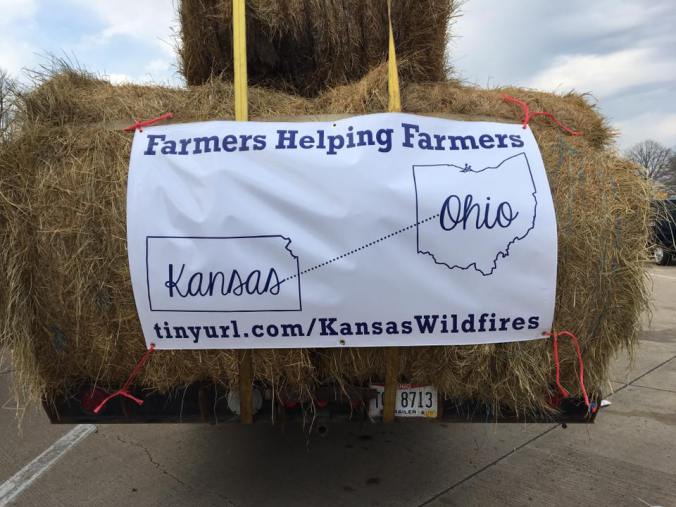
My mother has always referred to extraordinary acts of kindness, done without any self-gain, as “brownie points toward heaven.”
These acts are often difficult and require sacrifice, and are done without any expectations.
A group of 126 folks from Ohio’s ag industry were undoubtedly showered with brownie points, as they loaded up semi-tractor trailers, trucks and cars with hay, fencing materials, milk replacers and other supplies and delivered them to wildfire victims in Kansas.
Nothing is easy about farm life: The risks are always present; the rewards are never promised. With the ag industry on a three-year slide, this outreach was certainly extraordinary, but not incredibly surprising. Farmers have been extending lifelines to those struggling for years, proving once again there is no greater pride than being a farmer. They know what it is like to suffer, through no fault of their own. It is through these trials that a deep-rooted empathy has been embedded. So when millions of acres in Texas, Colorado, Kansas and Oklahoma were decimated by raging wildfires, these farmers and drivers were giving more than hay and supplies, they were giving back hope to those that lost animals, crops, homes, equipment, barns and even loved ones.
The 1,100-mile journey to Ashland, Kan., started with a group leaving London to meet up at the staging area, which was the last rest area on I-70 Westbound between Route 127 and the Indiana state line.
The idea started with Jason Nuhfer, Dan Duma and Luke Worcester, who wanted to bring a couple loads of hay to the city, where 90% of its county is in ashes. When the call went out to others who might want to contribute, the response was overwhelming, according to Rose Hartschuh, who took on the role as chief organizer. “Once we put it on social media, we were just blown away with the response,” says Rose, who owns a dairy farm with her husband, Greg, in Crawford County. “People were asking, ‘What else can we do.’ They wanted to make the most impact.”
A group plan was formed through a Google forum that helped organize supplies, logistics and labor.
After a couple of weeks of gathering supplies, the caravan departed Ohio on March 24. In addition to the hefty donation, Rose organized a group of 24, mostly young farmers, who volunteered for three days of cleanup and fence-building.
Here’s a quick look at the effort and what can be accomplished when people come together:
• number of people: 126
• number of vehicles: 45 (4 more vehicles joined over the weekend)
• value of hay — $41,000
• value of feed — $11,500
• value of fencing — $3,250
• donations — $29,000
• total value of supplies and cash — $84,750
The value of knowing people care — priceless.
“We read many of their stories of devastation before we left, but what we saw was really overwhelming,” Rose says. “To see it firsthand really put into perspective the challenges they were facing.”
Other groups and individual donations have since made their way to these ravaged areas – including a group from the Eastern side of Ohio and donations by high schoolers.
Each load is a new dose of hope. Rose says, despite the horrific situation, the impacted farmers and ranchers remain optimistic. “Surprisingly, they have a very positive attitude, which is very inspiring. They have every reason to be down and out, yet they are determined to rebuild.”
Extraordinary, but not surprising.
To learn more about the effort, visit Ohio’s Kansas Wildfire Relief Efforts on Facebook. Donations by check can be made out to “Ohio’s Kansas Rancher Wildfire Relief Fund” and mailed to 6348 Parks Road, Sycamore, OH 44882. A benefit account has been set up at United Bank, and the EIN is 82-0824958.
About the Author(s)
You May Also Like






